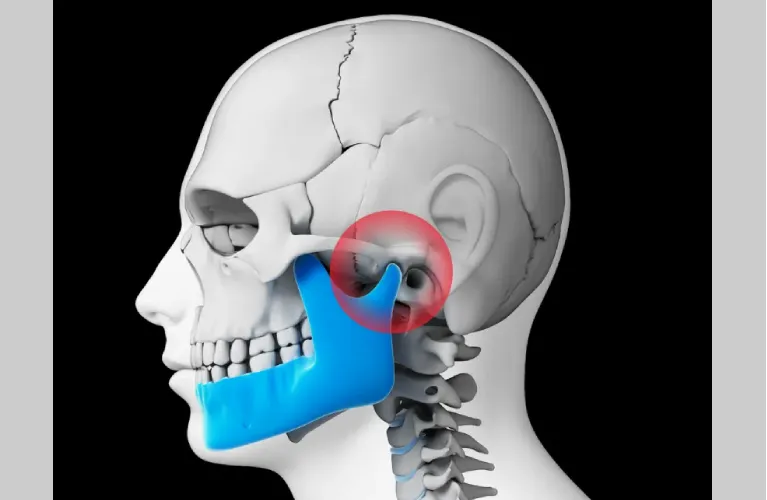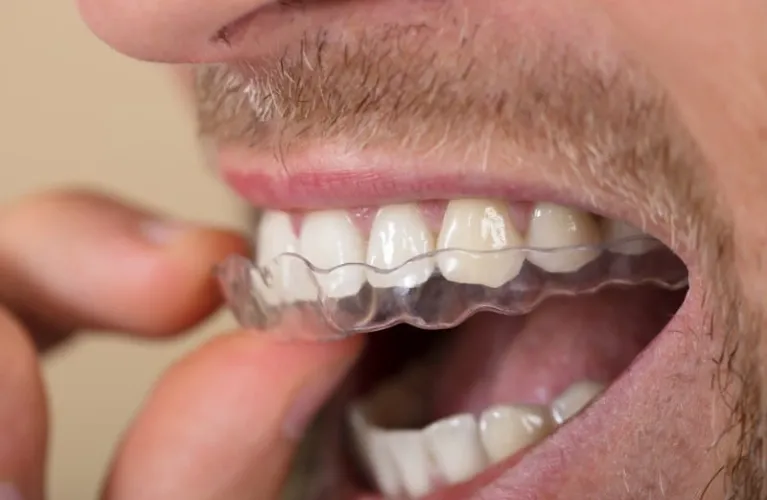
TMJ / TMD Treatment TM

Temporomandibular disorders (TMJ and TMD) are common disorders that affect the jaw, face, neck and shoulders. If you experience pain in your face, jaw, neck or shoulders, you may suffer from a temporomandibular disorder. These disorders are commonly known as TMJ and TMD.
TMJ is the condition that affects your temporomandibular joint. It’s a joint between your jaw and the temporal bones (the bones behind your ears). Without it, you wouldn’t be able to speak, chew or perform other movements with your mouth. Problems with your temporomandibular joint, called TMJ, are categorized as temporomandibular disorders (TMDs), meaning they affect the temporomandibular joint.
In general, TMJ refers to the specific problem in the jaw joint itself; TMDs are caused by misaligned teeth or jaws, known as a poor bite; grinding or clenching of teeth, known as bruxism; arthritis in the joint; or movement in the disc between the ball and socket of the joint.
Are you suffering any of these symptoms ?
- Jaw Pain
- Throat Pain
- Neck Pain
- Ear Pain
- Eye Pain
- Mouth Problems
- Teeth Pain
- Headache / Migraine

Causes of TMJ / TMD
TMJ / TMD is a condition that affects the joints in your face, specifically the jaw and TMJs. It can be caused by trauma, poor bite alignment, or clenching or grinding the teeth.TMJD can affect one side of your face, or both sides. It’s more common in women than men, but happens equally often among people of all ages.
TMJD isn’t always caused by one specific thing. For example, injury to the jaw can cause TMJ / TMD as well as trauma to the head and neck. It can also be caused by:
- Hyperactivity or Inactivity of Jaw muscles
- Misaligned teeth or jaws – known as a poor bite
- Grinding or clenching the teeth – known as bruxism Arthritis in the joint – osteoarthritis or rheumatoid arthritis
- Movement in the disc between the ball and socket of joint – congenital scoliosis (curvature of spine)

How Are TMJ And TMD Treated?
TMJ / TMD can affect anyone, but it’s often more severe in those who have a history of jaw injury. If you’re experiencing pain in your jaw, we recommend scheduling an appointment to discuss your symptoms and work out a treatment plan that fits your needs.Your treatment may include:
Orthodontic treatment: Braces, Invisalign® (Aligners) and other orthodontic treatments may be recommended to treat your poor bite. Realigning your teeth and jaws can address the underlying cause of your pain and prevent further damage to your teeth.
Oral appliances: Mouthpieces such as splints and night guards can alleviate the effects of teeth clenching or grinding. These are plastic appliances that fit over your upper and lower teeth to keep them from touching. A splint must be worn at all times while night guards are worn during sleep.
Permissive splints, which include bite planes and stabilization splints, are used to help patients with severe jaw conditions, including bruxism, jaw clicking, and TMJ pain. These splints can be fitted to the upper or lower teeth. With these types of splints, the biting surface is smooth and flat, letting the teeth glide unimpeded and the jaw to close and slide freely to achieve a more balanced resting point.
The permissive splint is a simple device that helps align your bite for more comfortable wear. It comes in two main varieties: bite planes and stabilization splints. Both types of splint are made from durable materials that are flexible yet strong enough to support your teeth while they heal.
FAQ
What is the difference between TMJ and TMD?
These two terms are closely related and often get mixed up. TMJ stands for temporomandibular joint, which is the joint that connects the lower jaw to the skull. TMD stands for Temporomandibular Disorder, which is what occurs when the TMJ is affected by issues that often lead to discomfort or pain.It’s not uncommon for the term TMJ to be used in place of TMD.
Who can diagnose TMJ disorders? How is TMJ diagnosed?
If you’re experiencing consistent pain or discomfort in neck, jaw, eye, ear or shoulder, it’s time to see a professional who can help diagnose the severity of your disorder and find solutions that work for you. You can make an appointment with us or a prosthodentist who has advanced training in diagnosing and treating TMJ disorders.
How can I prevent TMJ disorders?
To prevent developing a TMJ disorder, practice good posture and relaxing the jaw muscles whenever possible. Do you best to reduce stress and jaw tension.It’s also important to have regular dental checkups performed so that your dentist can catch any potential bite or jaw issues early on, offering you the chance to take more preventative measures.

